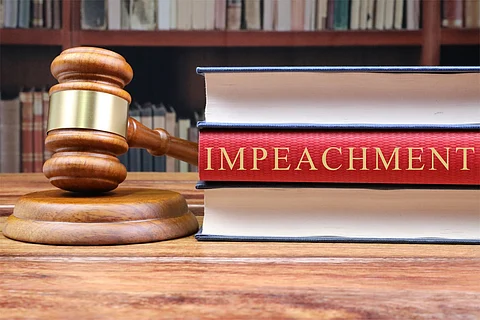

The impeachment proceedings against Justice Yashwant Varma have ignited extensive debate throughout India. The case is currently proceeding as an impeachment process in Parliament, with 145 MPs submitting a notice to the Lok Sabha Speaker, potentially setting the stage for India’s first impeachment action against a sitting High Court judge.
Historically, no Indian judge has faced successful impeachment; previous attempts, such as those against Justice V. Ramaswami in 1993 and Justice Soumitra Sen in 2011, either ended in failure or resignation before a verdict. Should the current proceedings succeed, Justice Varma would become the first Indian judge to be impeached. Meanwhile, CJI BR Gavai recused himself from the case on July 23, 2025, due to his earlier involvement in related discussions. Senior advocate Kapil Sibal called for an expedited hearing, and CJI Gavai assured that a new bench would be formed.
Impeachment Process Kicks Off
The Indian Parliament has initiated impeachment proceedings against Justice Yashwant Varma of the Allahabad High Court, stemming from allegations of misconduct linked to the discovery of unaccounted cash at his official residence in Delhi. This constitutional procedure, governed by Articles 124, 217, and 218 of the Indian Constitution, as well as the Judges (Inquiry) Act of 1968, follows a structured protocol.
The impeachment process kicks off with a motion notice supported by at least 100 Lok Sabha MPs or 50 Rajya Sabha MPs. On July 21, 2025, a group of 145 Lok Sabha and 63 Rajya Sabha members submitted their notices to Lok Sabha Speaker Om Birla and Rajya Sabha Chairman Jagdeep Dhankhar to initiate the impeachment against Justice Varma. The coalition spans various political parties, including BJP, Congress, TDP, and JDU, and features prominent leaders such as Anurag Thakur, Ravi Shankar Prasad, Rahul Gandhi, Supriya Sule, and KC Venugopal.
Upon receiving the motion, the Speaker or Chairman assesses its validity. Both notices were accepted, and the Rajya Sabha Chairman directed that the process be advanced after verifying the requisite number of signatures.
Formation of Inquiry Committee
Following the acceptance of the notice, a three-member inquiry committee is established, comprising a Supreme Court judge, a High Court Chief Justice, and a recognized legal expert. An established in-house committee designated by the Supreme Court, which included Justices Sheel Nagu, GS Sandhawalia, and Anu Sivaraman, previously conducted an investigation, presenting their findings on May 3, 2025. The report revealed the presence of burned currency notes in a storeroom associated with Justice Varma, concluding that the evidence justified the impeachment. The inquiry committee undertakes a comprehensive investigation, scrutinizing evidence and witness statements, and is mandated to submit its findings to Parliament within one to three months.
Parliamentary Discussion and Voting
Post-report presentation, the findings will be debated in both Houses of Parliament. Approval of the impeachment motion requires a special majority—specifically, two-thirds of the members present and voting, as well as a majority of the total membership in each House.
Current Developments
The impeachment motion is set for discussion in the ongoing Monsoon Session of Parliament, which began on July 21, 2025, and is expected to conclude by August 21, 2025. The government, with the support of Union Parliamentary Affairs Minister Kiren Rijiju, is working towards achieving a political consensus, although MPs from the Trinamool Congress and Samajwadi Party have not signed the notices. Following the March 14, 2025 incident, where burnt cash was discovered during a fire at his residence, Justice Varma was transferred from the Delhi High Court to the Allahabad High Court. He is currently contesting the inquiry committee's findings in the Supreme Court, alleging jurisdictional overreach and a violation of his right to a fair process—a challenge that may delay the impeachment proceedings.
Background Context
On March 14, 2025, a fire occurred at Justice Varma’s official residence in Delhi, where a significant quantity of charred Rs 500 notes was discovered in a storage area, raising corruption allegations within the judiciary. A three-member internal committee, established by then-Chief Justice of India (CJI) Sanjiv Khanna, conducted an investigation, interviewed 55 witnesses over a span of 10 days, and produced a report indicating “strong evidence” of “serious misconduct” by Justice Varma. Following this report, CJI Khanna recommended to Parliament the initiation of impeachment proceedings on May 8, 2025. However, Justice Varma contested the committee's findings by appealing to the Supreme Court on July 18, 2025, claiming he was denied a fair chance and that the process was unconstitutional.
Concerns and Criticism
Senior advocate Kapil Sibal has raised alarms over the government's approach, suggesting that relying solely on the Supreme Court’s in-house report, without adhering to the provisions of the Judges (Inquiry) Act, 1968, may pose constitutional challenges and compromise judicial independence. He also highlighted apparent selective enforcement, drawing attention to the stalled impeachment motion against Justice Shekhar Yadav for alleged communal remarks. This evolving situation underscores the delicate balance between judicial accountability and independence, with significant implications for India’s judicial framework if the impeachment proceeds.
